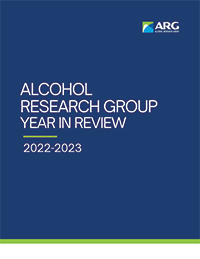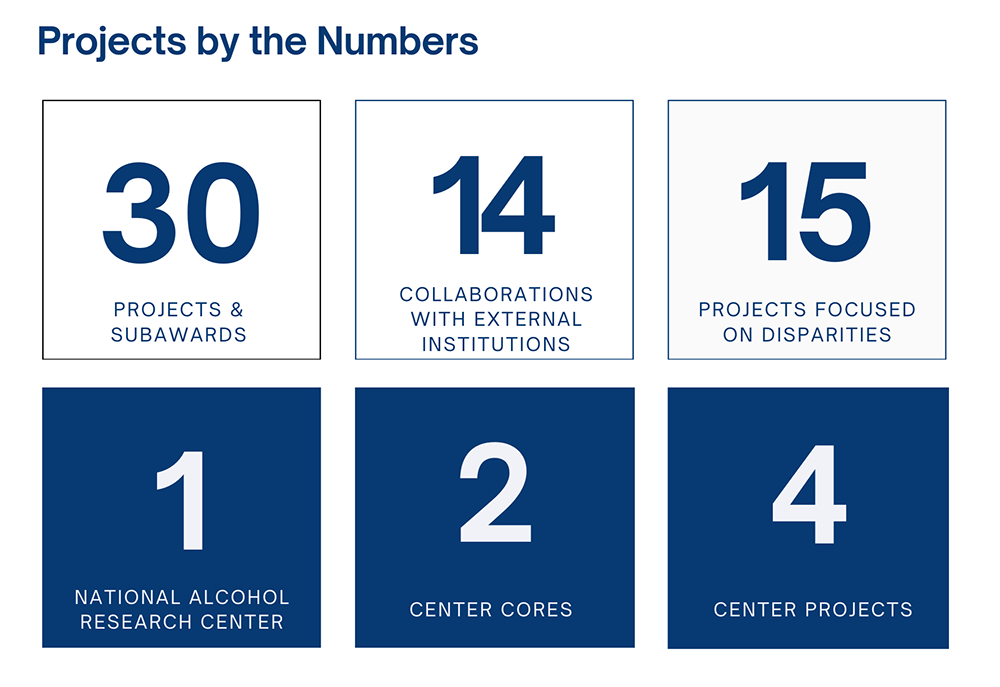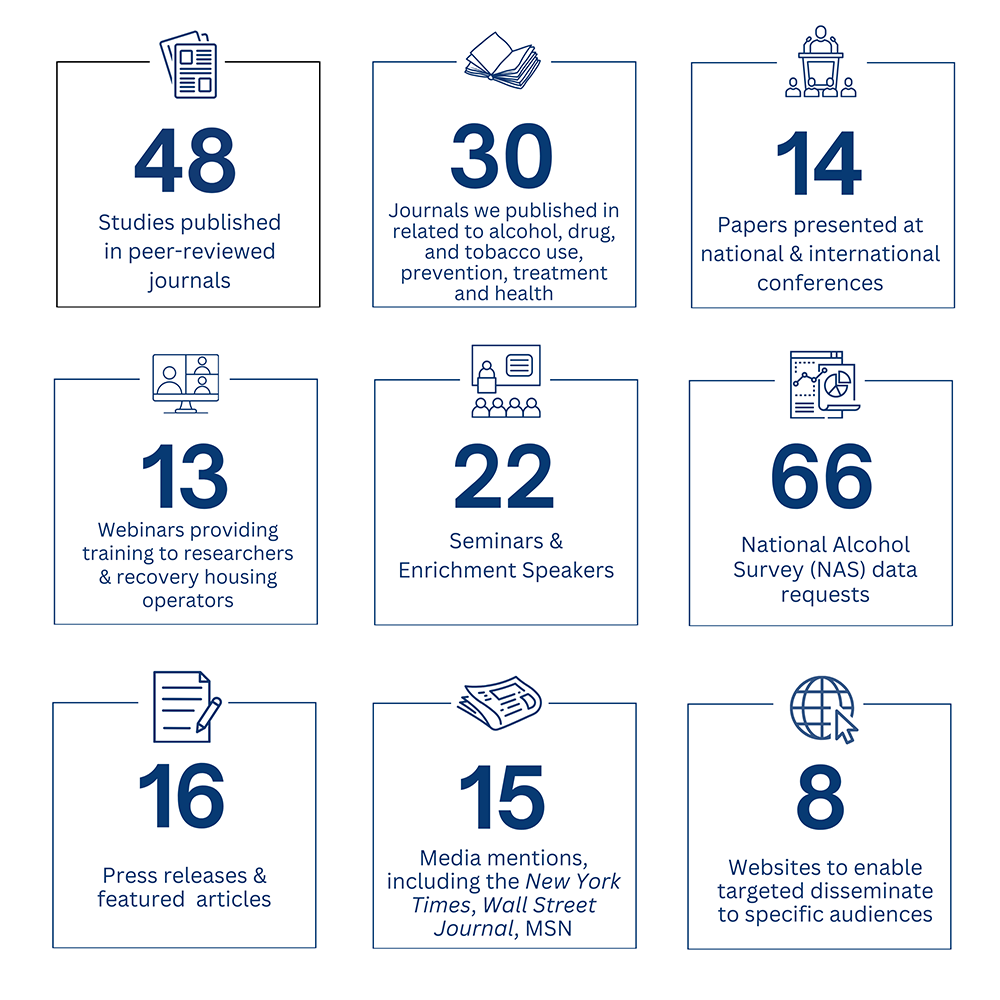 2023 was a year of change and growth for our organization with staff retirements, new hires, new scientific leadership, and a re-imagining of our future.
2023 was a year of change and growth for our organization with staff retirements, new hires, new scientific leadership, and a re-imagining of our future.
As we move into 2024 and celebrate our 65th anniversary, we’d like to share our research, successes, and changes we’ve undergone over the past year. We also want to express our gratitude for your continuing support of the work we do. Thank you.
Download the full report or review its sections by clicking on the tabs below.
- Directors' Summary
- Leadership Transition
- Research Highlights
- Selected New Projects
- Training Program
- Dissemination by the Numbers
Each year, ARG works to advance knowledge of the epidemiology of alcohol and other drug use in the US. We examine how alcohol and drug use changes over time, how use affects individuals, families and communities, how best to address the needs of people with substance use disorders, and how environmental and social structures drive alcohol- and drug-related health inequities.
We provide strong training and development of early-career scientists, in large part via our pre- and postdoctoral fellows in collaboration with the School of Public Health at UC Berkeley. In 2023 we worked diligently with PHI and UC Berkeley to create a new administrative system between ARG and UC Berkeley that will support the continuation and success of our training program.
In April 2023, Thomas K. Greenfield, PhD, stepped down as scientific director. We are grateful for his leadership over the past fifteen years and the progress our organization has made under his direction. Tom continues his work at ARG in the role of senior scientist and co-director of the Center’s Statistical Core. Dr. William C. Kerr assumed the position of scientific director and Dr. Priscilla Martinez assumed the new position of deputy scientific director.
In 2023, we initiated and implemented changes in how we operate and recommitted to refining our mission and strategic vision to ensure our sustainability as an innovative research organization. This was accomplished via a formal strategic planning process through a lens of diversity, equity, inclusion and belonging. This process is helping us to expand our research portfolios and to improve our efficiency as a soft-money organization. It is an ongoing process, and we look forward to continuing this work in 2024.

We are excited for the upcoming year — our 65th — and the positive impacts we will make here and around the world. Thank you for your continued dedication to the advancement of alcohol and drug research and for helping us strive for even greater impacts in 2024.
William C. Kerr and Priscilla Martinez, Scientific Leadership Team

ARG Scientific Director Steps Down, Leaves Behind a Lasting Legacy
After 15 years of dedicated service, Thomas (Tom) K. Greenfield, PhD, stepped down as ARG’s scientific director. Tom will continue as a senior scientist and co-director of the High Intensity Drinking Research Project and the Statistical & Data Services Core in the National Alcohol Research Center.
Throughout his tenure, Tom built important collaborations with external institutions, oversaw the successful submission of three P50 Center grants, supported the development of organizational operations, and brought about stronger staff compensation policies, among many other accomplishments.
Read more about Tom's contribution to ARG's success.
Congratulations to ARG's New Scientific Leadership Team
 An economist by training, with a doctoral dissertation on Addiction, Quality Choice, and the Demand for Alcohol from University of California, Davis, ARG’s new Scientific Director, William (Bill) C. Kerr, was recruited to ARG in 2001. From the beginning, Bill led Center projects involving methodological intake protocols and age-period-cohort analyses. In 2016, Bill took over as Center Director, with an increasing focus on alcohol-related disparities. He also leads the NIAAA Graduate Research Training program. Bill has extensive experience as PI on NIAAA and NIDA funded grants, and leads contracts and subawards.
An economist by training, with a doctoral dissertation on Addiction, Quality Choice, and the Demand for Alcohol from University of California, Davis, ARG’s new Scientific Director, William (Bill) C. Kerr, was recruited to ARG in 2001. From the beginning, Bill led Center projects involving methodological intake protocols and age-period-cohort analyses. In 2016, Bill took over as Center Director, with an increasing focus on alcohol-related disparities. He also leads the NIAAA Graduate Research Training program. Bill has extensive experience as PI on NIAAA and NIDA funded grants, and leads contracts and subawards.
 To support ARG’s scientific efforts and organizational oversight, the Executive Committee has elected Scientist Priscilla Martinez, PhD, to the new role of deputy scientific director.
To support ARG’s scientific efforts and organizational oversight, the Executive Committee has elected Scientist Priscilla Martinez, PhD, to the new role of deputy scientific director.
After her undergraduate work in biochemistry and molecular biology at Mills College, Priscilla received her doctorate from the Norwegian Center for Addiction Research, University of Oslo, Norway. As lead Co-director of the Center’s National Alcohol Survey research project, she continues her work on survey research and has, for the first time, introduced the collection of biological samples.
Disparities & Inequities

Disparities in At-Risk Drinking Among People with Diabetes, Cancer, or a Heart Condition
A new study. led by Scientist Christina Tam, PhD, found that older non-Hispanic white adults with diabetes or a heart condition were less likely to engage in at-risk drinking than their counterparts who did not have diabetes, cancer, hypertension, and heart conditions. However, among older Black, Hispanic/Latinx, and Asian adults, at-risk drinking rates were similar between individuals living with and individuals living without these health issues. This disparity raises the question of why some race and ethnicity groups continue drinking at risky levels even with a health condition diagnosis. Read more
 COVID-19 Study Finds Striking Inequities in Access to Health Care During the Pandemic
COVID-19 Study Finds Striking Inequities in Access to Health Care During the Pandemic
US national study reveals disparities in general and behavioral health care receipt, suggests telehealth is a vital bridge to care for traditionally underserved groups.
During the first year of the pandemic, Hispanic/Latinx individuals and lower-income individuals were less likely to receive needed health care when compared to White individuals and people with higher incomes. When examining telehealth utilization, which included connecting with a health care provider by video, phone, or email, some traditionally underserved groups reported high rates of telehealth use. Senior Scientist Nina Mulia, DrPH, led the study. Read more
Alcohol Policy
 Expansion of Medicaid Increases Alcohol Screenings and Highlights Need for Policies, Programs that Improves Patient Screenings
Expansion of Medicaid Increases Alcohol Screenings and Highlights Need for Policies, Programs that Improves Patient Screenings
People living in U.S. states with expanded Medicaid access are more likely to receive alcohol screening during primary care checkups than people living in states that did not expand Medicaid access. The study, led by Aryn Phillips, PhD, also revealed the need for improvements in alcohol screenings for patients who do receive Medicaid, including comprehensive, evidence-based screenings or brief counseling.
Findings suggest that expanded Medicaid access may increase screening rates through increased access to primary care. They also highlight the need for policies and programs that limit healthcare provider constraints and support healthcare providers in offering evidence-based screenings and counseling of alcohol use on a consistent basis. Read more
 Availability of Alcohol to-go Drinks and Home Delivery Soared During the First Year of the Pandemic
Availability of Alcohol to-go Drinks and Home Delivery Soared During the First Year of the Pandemic
During the first year of the pandemic, the number of people who live in a state that allowed bars and/or restaurants to deliver alcohol rose by 284%. This increase was more dramatic for to-go sales, climbing by 627%.
The study is the first to provide nationally-representative estimates of how many people have access to and used alcohol home delivery and to-go sales. Other findings showed that delivery and to-go purchases were more common among heavier drinkers who have greater risk of alcohol-related harms. The study was led by Scientist Pamela Trangenstein, PhD. Read more
Cannabis
 Childhood Adversity Before Age 5 Associated with Greater Cannabis Use in Early Adolescence
Childhood Adversity Before Age 5 Associated with Greater Cannabis Use in Early Adolescence
Scientist Camillia Lui, PhD, led a study on early childhood adversity (ECA) was associated with greater behavioral issues and lower academic performance in childhood, which predicted increased substance use in adolescence and, in turn, lower high school completion by age 19.
Exposure to adverse conditions early in life can affect a young child's neural, cognitive, and emotional development. Extensive research has established a strong association between childhood adversity before age eighteen and substance use in adolescence and adulthood. However, little attention has been placed on early life adversity and the mechanisms linking this with outcomes years later. Read more
Treatment & Recovery
 Defining Recovery — as People in Recovery See it
Defining Recovery — as People in Recovery See it
US study asked almost 10,000 people in recovery from substance use how they define recovery and found that over 90% agreed that recovery is comprised of four key elements: a process of growth and development; being honest with myself; taking responsibility for the things I can change; and reacting to life's ups and downs in a more balanced way than I used to.
Senior Scientist and lead author Sarah E. Zemore and colleagues' analysis of this diverse, national sample of people in self-defined recovery suggests that recovery definitions are not totally relative: Rather, people who are in recovery generally agree on what recovery means, even when they’re coming from very, very different places. Read more.
Black, Hispanic/Latinx, and Younger Adults are Less Likely to Attend AA
In another study led by Senior Scientist Sarah E. Zemore, Black and Hispanic/Latinx adults with an alcohol use disorder were about 40% less likely to have ever attended Alcohol Anonymous meetings versus their White counterparts. An even greater difference was found between people younger than 30 and relatively older adults.
Among adults younger than 30, less than 5% had ever attended AA versus about 12% of adults age 30 and older. After adjusting for other factors, the younger group attended AA at about a third of the rate of older respondents. Read more

Trauma, Substance Use, and Incarceration Over the Lifecourse: Identifying Social Supports to Promote Resiliency in a US National Cohort Study
This NIDA-funded study investigates race and ethnicity differences in trauma exposures during an understudied developmental period, emerging adulthood, and how trauma may influence risk for incarceration through cannabis and other drug use.
This secondary analysis study leverages data from the National Longitudinal Study of Adolescent to Adult Health (Add Health) and integrates a lifecourse approach into an ecological framework to examine trauma exposures found prevalent in minoritized communities, including community violence exposure and intimate partner violence. Read more
Enhancing Effectiveness Research on Recovery Housing for Persons Prescribed Medication for Opioid Use Disorder
Recovery housing may be a critical component in a comprehensive response to the current opioid crisis, but evidence-based practices in recovery housing for those being treated with medications for opioid use disorders (MOUD) are lacking.
By developing a national multi-stakeholder network, hosting educational webinars for researchers and recovery housing providers, and supporting mentored pilot studies for new recovery housing researchers, this NIDA-funded project will create the infrastructure necessary to begin developing this evidence base. Read more
National Alcohol Survey Sexual and Gender Minority Oversample
Sexual and gender minorities (SGM) experience notably greater hazardous alcohol and drug (AOD) use compared to cisgender heterosexuals. Efforts to study these disparities and advance SGM health equity have expanded and matured over the last few decades. However, studies are often limited in their ability to make meaningful comparisons between SGM and cisgender heterosexuals, and to delve into subgroup differences within SGM, due to the challenge of recruiting large enough SGM and comparison samples.
This NIAAA administrative supplement to the National Alcohol Survey, led by PI William C. Kerr, PhD, and Scientist Priscilla Martinez, PhD, will collect an oversample of 1,200 SGM participants and will enable us to identify risk and protective factors that will inform interventions to reduce disparities in risk for hazardous AOD use and related problems in SGM communities. Read more

For 53 years, ARG’s research training program, in collaboration with UC Berkeley, has mentored and supported over 280 scientists who have gone on to work at organizations and universities around the country.
Predoctoral Fellows
The program celebrated the graduation of two predoc fellows, Peter Soyster, and Angie Wootton, and welcomed Ida Wilson.
Ida Wilson, MA, is a qualitative and critical researcher who is a DrPH candidate at UC Berkeley School of Public Health. Her current research is focused on framing police violence as a public health issue by examining the experiences of Black and Latina women in Oakland. Ida’s research will explore the extent to which substance use is a health outcome as a result of exposure to police violence. Her mentors at ARG are Senior Scientist Nina Mulia, DrPH, and Scientist Christina Tam, PhD.
Postdoctoral Fellows
 Erika Rosen
Erika Rosen
In Erika’s second year of her fellowship, she continues to work on her project that involves the creation and application of a structural racism measure(s) in the context of both hazardous alcohol use and cardiovascular risk factors and outcomes.
Erika also presented findings from the 2019-2020 US National Alcohol Survey at the Society for Epidemiologic Research (SER) annual meeting and her poster was chosen from almost 300 posters for a session award. At the American Public Health Association (APHA) Annual Meeting & Expo in November 2023, her project work was one of ten abstracts selected for an alcohol oral presentation.
She was also the recipient of the Delta Omega Doctoral Award from LSU Health Sciences Center (Alpha Psi chapter), an award based on publications, presentations, service, and dissertation.
Erika is currently working on her first R21 submission.
 Anthony Surace
Anthony Surace
Anthony’s second year project examines changes in substance use among sexual minorities as LGBT laws/policies have evolved over time, using data from the National Alcohol Survey (NAS) series. To support this work, Anthony completed Temple University’s Global Certificate in Legal Epidemiology.
He also conducted qualitative analyses on the CARE study, which seeks to understand individuals’ narratives around drinking during the COVID-19 pandemic. He also presented his work at a poster session at the annual meeting of the Research Society on Alcoholism. Anthony is currently working on an R21 grant submission.

